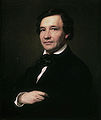
Wilhelm Taubert
Encyclopedia

Berlin
Berlin is the capital city of Germany and is one of the 16 states of Germany. With a population of 3.45 million people, Berlin is Germany's largest city. It is the second most populous city proper and the seventh most populous urban area in the European Union...
, 23 March 1811 – Berlin, 7 January 1891) was a German pianist
Pianist
A pianist is a musician who plays the piano. A professional pianist can perform solo pieces, play with an ensemble or orchestra, or accompany one or more singers, solo instrumentalists, or other performers.-Choice of genres:...
, composer
Composer
A composer is a person who creates music, either by musical notation or oral tradition, for interpretation and performance, or through direct manipulation of sonic material through electronic media...
, and conductor
Conducting
Conducting is the art of directing a musical performance by way of visible gestures. The primary duties of the conductor are to unify performers, set the tempo, execute clear preparations and beats, and to listen critically and shape the sound of the ensemble...
.
Taubert studied under Ludwig Berger (piano) and Bernhard Klein
Bernhard Klein
Bernhard Klein was a German composer.Klein was born in Cologne. He married Lilly Parthey , who was the sister of Gustav Parthey and the granddaughter of Friedrich Nicolai...
(composition). In 1831 he became assistant conductor and accompanist for Berlin court concerts. Between 1845 and 1848 he was music director of the Berlin Royal Opera, and was also court conductor in Berlin from 1845 to 1869. From 1865, he taught music at the Royal Academy of the Arts; Theodor Kullak
Theodor Kullak
Theodor Kullak was a German pianist, composer, and teacher.-Background:Kullak was born in Krotoschin in the Grand Duchy of Posen, in Wielkopolska - western part of Poland taken during the second partition of Poland by Kingdom of Prussia. He began his piano studies as a pupil of Albrecht Agthe in...
was one of his pupils.
His compositions include six opera
Opera
Opera is an art form in which singers and musicians perform a dramatic work combining text and musical score, usually in a theatrical setting. Opera incorporates many of the elements of spoken theatre, such as acting, scenery, and costumes and sometimes includes dance...
s, incidental music
Incidental music
Incidental music is music in a play, television program, radio program, video game, film or some other form not primarily musical. The term is less frequently applied to film music, with such music being referred to instead as the "film score" or "soundtrack"....
, four symphonies
Symphony
A symphony is an extended musical composition in Western classical music, scored almost always for orchestra. A symphony usually contains at least one movement or episode composed according to the sonata principle...
, concerto
Concerto
A concerto is a musical work usually composed in three parts or movements, in which one solo instrument is accompanied by an orchestra.The etymology is uncertain, but the word seems to have originated from the conjunction of the two Latin words...
s for piano and cello, four string quartet
String quartet
A string quartet is a musical ensemble of four string players – usually two violin players, a violist and a cellist – or a piece written to be performed by such a group...
s, other orchestral, choral, and piano works, and more than 300 songs. His early compositions were praised by the composer Felix Mendelssohn
Felix Mendelssohn
Jakob Ludwig Felix Mendelssohn Barthóldy , use the form 'Mendelssohn' and not 'Mendelssohn Bartholdy'. The Grove Dictionary of Music and Musicians gives ' Felix Mendelssohn' as the entry, with 'Mendelssohn' used in the body text...
, who had also studied piano with Berger.
His grave is preserved in the Protestant Friedhof I der Jerusalems- und Neuen Kirchengemeinde (Cemetery No. I of the congregations of Jerusalem's Church
Jerusalem's Church
Jerusalem's Church is one of the churches of the Evangelical Congregation in the Friedrichstadt , a member of the Protestant umbrella organisation Evangelical Church of Berlin-Brandenburg-Silesian Upper Lusatia. The present church building is located in Berlin, borough Friedrichshain-Kreuzberg, in...
and New Church
Deutscher Dom
Deutscher Dom is the colloquial naming for the New Church located in Berlin on the Gendarmenmarkt across from Französischer Dom . Its parish comprised the northern part of the then new quarter of Friedrichstadt, which until then belonged to the parish of the congregations of Jerusalem's Church...
) in Berlin-Kreuzberg
Kreuzberg
Kreuzberg, a part of the combined Friedrichshain-Kreuzberg borough located south of Mitte since 2001, is one of the best-known areas of Berlin...
, south of Hallesches Tor
Hallesches Tor (Berlin U-Bahn)
The underground station Hallesches Tor is part of the Berlin U-Bahn network at the intersection of the east-west bound U1 and the north-south bound U6 in the Kreuzberg district.-Overview:...
.
Operas
- Die Kirmes, komische Oper, libretto by Eduard DevrientEduard DevrientEduard Devrient was a German baritone, librettist, playwright, actor, theatre director and theatre reformer and historian.Devrient came from a theatrical family...
, 23 January 1832, Berlin, Königliches Theater - Die Zigeuner, libretto by Eduard Devrient, 14 September 1834, Berlin, Königliches Theater
- Marquis und Dieb, komische Oper, libretto by L Schneider, 15 February 1842, Berlin, Königliches Theater
- Joggeli, libretto by H Kloster, 9 October 1953, Berlin, Königliches Theater
- Macbeth, libretto by F H Eggers, 16 November 1857, Berlin, Königliches Theater
- Caesario, oder Was ihr wollt, komische Oper, libretto by E Taubert, 13 November 1874, Berlin, Königliches Theater

